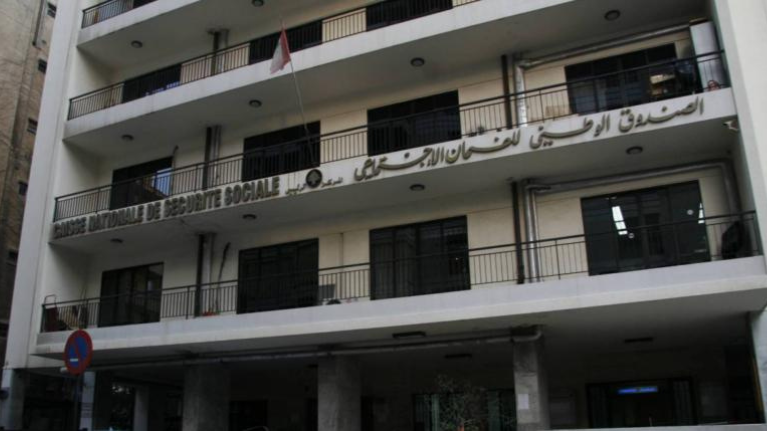Urgent reforms are needed to restore adequate coverage by Lebanon’s National Social Security Fund
A study by the ILO Regional Office for the Arab States outlines the results of a first-of-its-kind assessment of the financial situation of Lebanon’s National Social Security Fund.

The ILO Regional Office for the Arab States launched in February 2023 a study outlining the results of a first-of-its-kind assessment of the National Social Security Fund’s financial situation. The study identifies risks and provides five-year cash flow projections for each of the three NSSF branches: Sickness and Maternity (S&M), end of service indemnity (EOSI), and family allowances. The independent assessment was conducted in collaboration with the NSSF during the course of 2022 with the engagement of a team of Lebanese actuarial and accounting firms.
Dwindling benefit values
While each of the three NSSF branches are in positive net positions, their provisions lag behind the real costs of living and of healthcare. As long as salaries and contributions remain well below their pre-crisis value, the NSSF will not have the required resources to adjust its benefits.
Benefit adequacy has plummeted in the EOSI scheme. An employee retiring after 30 years of contributory service with a last salary worth 1,000 USD in October 2019 would have received an EOSI of 35,000 USD. Today, his declared salary at the minimum wage of 9,000,000 Lebanese pounds (LBP), would grant a one-off pension benefit worth only around 3,000 USD.
As for the Sickness and Maternity branch, a short-term benefit largely reliant on current inflow of resources, scenarios with various levels of optimism were presented; the best of which would allow the NSSF to provide 50 per cent of its pre-crisis coverage. Under all scenarios, healthcare expenses are expected to highly exceed the Fund’s yearly revenues given that medical inflation exceeds salary growth considerably, with the devaluation of the currency and the dollarization of healthcare costs.
Breaking the vicious cycle of the under-declaration of salaries
The common current practice of under-declaration of salaries means fewer resources are available to adjust and pay benefits. Less adequate coverage, in turn, leads to diminished trust in the NSSF and diminishing contributions, locking the social security system and its members in a vicious cycle. If this trend is not reversed, the tendency will be to resort to private insurance, which undermines the economic value invested in social solidarity.
The under-declaration of salaries is in fact partly due to the exponential increase in settlement payments that employers are bound by law to pay to cover for the resulting gap in individual EOSI accounts. The study estimates that as a result of the recent minimum wage increase to 9 million LBP, EOSI liabilities have increased to 105 trillion LBP – from 1.5 trillion in 2020, the majority of which is borne by employers in the form of settlement payments.
In addition, NSSF has limited financial capacity to cope with the crisis due to its asset portfolio, the majority of which are in the form of treasury bonds and bank deposits which have lost value with currency depreciation. While the fund is also owed money by the Lebanese government, for a total estimated amount of around 5 trillion LBP, the value of these government arrears represented in December 2022 only around 18 per cent of the total estimated NSSF assets. The net reserves of the NSSF were estimated at around 7 trillion LBP.
Urgent reforms can prevent collapse of social security
The assessment concludes that two high-level reforms are inevitable: structural changes to the current health coverage schemes, and a new old-age pension scheme. A draft legislation of the latter is currently in the parliament’s joint committees, and there’s an urgent need to pass this law. The conversion of the EOSI into a periodical pension system for private sector workers has been long-awaited and is a key requirement if Lebanon is to align with international social security standards. With the exception of the Occupied Palestinian Territory (OPT), Lebanon is the only country in the Arab world without a pension system for the private sector. Today, a transitional arrangement currently under consideration by the board of the NSSF could make a monthly pension of at least 40 per cent of their salary, regularly indexed with wage inflation, immediately available to NSSF insured members. However, under the current social security legislation in the country, such a system can only be rolled out on a voluntary basis and be sustained for a transitional period of three to five years, while the pension law is passed by parliament and implemented.
As to the health coverage scheme, the solution extends beyond the NSSF as different stakeholders should be brought together for a discussion around sector-wide reforms that would pave the way for a strategic recovery pathway from a failing health financing system. The assessment also included more detailed recommendations ranging from reforming purchasing mechanisms with medical providers, to reconsidering low salary caps on contribution payment.
Finally, benefit levels of the family allowance branch would need to be adjusted to provide adequate income support to families, a much-needed reform in the current crisis context.
The need for improving accounting standards and operations in the NSSF was also highlighted, as the study notes that all results presented “are based on NSSF’s weak accounting processes that, as is the case for other public institutions in Lebanon, do not follow international financial reporting standards,” adding that the figures had not been audited for over 10 years.
Check the full report, here.
This study was conducted as part of ILO engagement on Social Protection in Lebanon, with partial support from the European Union.